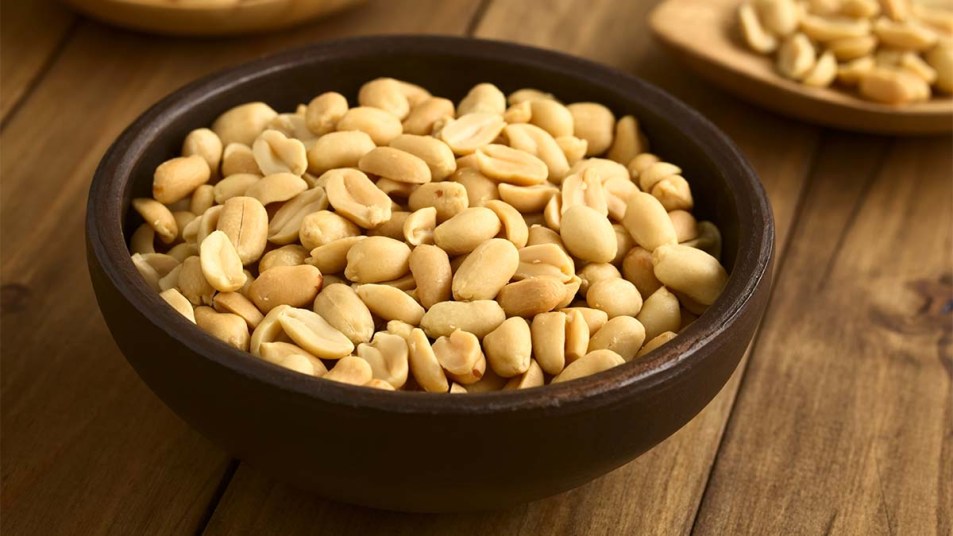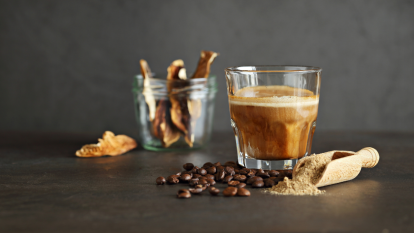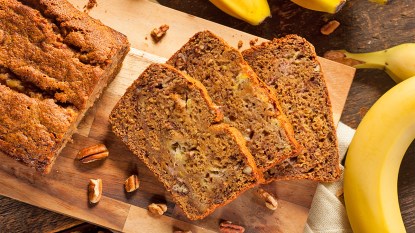October Nutrition News: Eating Peanuts Before Meals Speeds Slimming
The nutrition news that matters to you.

Small diet tweaks have the power to start improving your overall health. Plus, these changes are easy to implement into your diet at any time. Here are five nutrition news updates for October 2022 that demonstrate ways to adjust your mealtime habits.
The sweet secret to feeling sunnier is discovered.
You know a well-rounded diet can ward off blue moods, and new research in the British Journal of Nutrition reveals that fruit may be the key to feeling your happiest. The study showed that the subjects who often ate fruit, regardless of how much, had a lower risk of depression and better overall well-being than those who ate fruit less frequently. The researchers suspect that even low doses of nutrients from fresh and frozen fruit improve blood flow to the brain, an effect that is known to help foster a sunny outlook.
A simple tweak tames COVID.
Closing your kitchen at night may help ward off severe COVID-19 symptoms, report investigators in BMJ Nutrition, Prevention, and Health. Subjects in the study who regularly fasted for 12 hours daily (say, from 8 p.m. to 8 a.m.) were significantly less likely to be hospitalized after catching the virus. The researchers note that fasting did not reduce the risk of contracting COVID, but say it’s proven to reduce inflammation, which is a major risk factor for severe COVID symptoms. Plus, fasting speeds autophagy, the process by which the body destroys and recycles infected or damaged cells.
Eating peanuts speed slimming.
You don’t need to follow a strict diet to power off pounds, according to research in Nutrients. In the study, subjects who ate 30 peanuts twice daily 30 minutes before meals lost 15 pounds in six months, results similar to subjects on a strict, low-fat diet with no nuts. Plus, they improved their fasting glucose levels and had better insulin control. Per researchers, the protein in nuts promotes satiety, and their fiber and healthy fats reduce hunger-triggering spikes in blood sugar caused by carbohydrates.
This nutrient duo lowers kidney stone risk.
Calcium and potassium may be tops for preventing kidney stones, say Mayo Clinic scientists. They found that people who ate the most dietary calcium and potassium had a lower risk of the painful stones. The reason? Calcium bonds with stone-forming compounds and potassium shuttles them from the body. The recommended daily dose: 1,200 milligrams (mg) of calcium and 4,700 mg. of potassium, found in white beans, spinach, yogurt, and fortified cereals.
This tasty treat protects the heart.
Here’s another reason to enjoy a few squares of dark chocolate after dinner: It can safeguard against heart attacks. In a new study from Brigham and Women’s Hospital, investigators discovered that subjects who supplemented with 500 mg. of cocoa flavanols (equal to one medium-size bar of dark chocolate or 4 tablespoons of cocoa powder) daily had a markedly lower risk of cardiovascular events, like heart attack and stroke, than those who did not have cocoa. Previous research has revealed that cocoa’s flavanols lower blood pressure and cholesterol, plus improve blood flow, all of which provide a synergistic effect to reduce the risk of heart disease and related events.
A version of this article originally appeared in our print magazine, First for Women.













